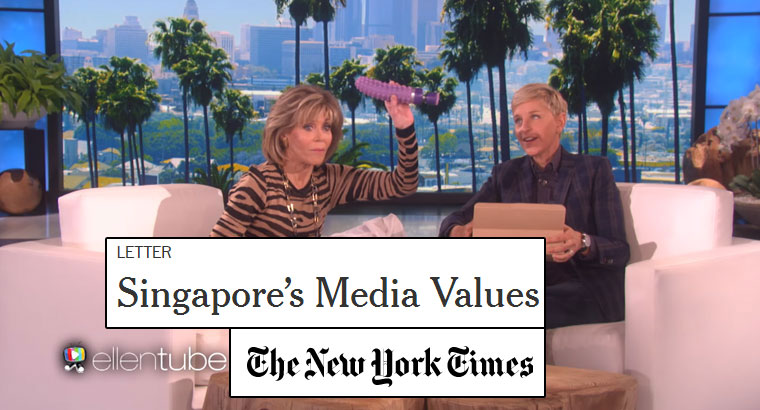The New York Times made an astute observation on May 21, 2017, that Singapore had apparently censored the second half of one episode of The Ellen DeGeneres Show.
The episode in question was aired in the United States on Monday, March 20, 2017.
The segment that was taken off air in Singapore featured actress Jane Fonda waving a vibrator and Orange Is the New Black star Asia Kate Dillon talking about her nonbinary gender identity.
The NYT article, by Balli Kaur Jaswal, discussed if full deletion of scenes can ever be warranted, or if other unwieldy methods of censorship, such as pixelating specific areas of the screen, are, in fact, more transparent, as they at least serve to inform viewers what images have been suppressed.
No mention was made in NYT if the Ellen episode was shown on cable or free-to-air television.
However, that point has been made slightly clearer -- that episode was on free-to-air television.
On May 26, 2017, the Singapore ambassador to the United States was given a right of reply as NYT published a letter rebutting the paper of record.
This is the response in full:
LETTER
Singapore’s Media Values
MAY 26, 2017
To the Editor:
“The Censor and the Vibrator,” by Balli Kaur Jaswal (Op-Ed, May 22), criticized how the media is regulated in Singapore.
One can read and see almost anything in Singapore, in private and online. But we treat free broadcasts differently. Singaporeans, like Americans, expect free content to conform to community norms, and to be suitable for viewers of all ages.
America’s norms differ from Singapore’s, but free content also conforms to standards that regulators deem appropriate for your society.
Just as Americans are offended by “wardrobe malfunctions” occurring on TV, Singaporean parents object to the broadcast of adult themes like masturbation. Every country regulates its media in accordance with its own social norms. Singapore’s approach is neither “insidious” nor “unsettling,” but a reflection of our own values and social mores.
ASHOK KUMAR MIRPURI
WASHINGTON
The writer is Singapore’s ambassador to the United States.
Related article:
S’pore censored Ellen show where Jane Fonda waved vibrator: New York Times
If you like what you read, follow us on Facebook and Twitter to get the latest updates.
If you like what you read, follow us on Facebook, Instagram, Twitter and Telegram to get the latest updates.
